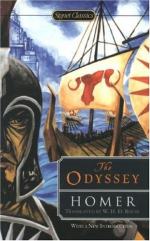Then the goddess, grey-eyed Athene, answered him: ’Yea now, I will plainly tell thee all. I avow me to be Mentes, son of wise Anchialus, and I bear rule among the Taphians, lovers of the oar. And now am I come to shore, as thou seest, with ship and crew, sailing over the wine-dark sea, unto men of strange speech, even to Temesa, {*} in quest of copper, and my cargo is shining iron. And there my ship is lying toward the upland, away from the city, in the harbour of Rheithron beneath wooded Neion: and we declare ourselves to be friends one of the other, and of houses friendly, from of old. Nay, if thou wouldest be assured, go ask the old man, the hero Laertes, who they say no more comes to the city, but far away toward the upland suffers affliction, with an ancient woman for his handmaid, who sets by him meat and drink, whensoever weariness takes hold of his limbs, as he creeps along the knoll of his vineyard plot. And now am I come; for verily they said that he, thy father, was among his people; but lo, the gods withhold him from his way. For goodly Odysseus hath not yet perished on the earth; but still, methinks, he lives and is kept on the wide deep in a seagirt isle, and hard men constrain him, wild folk that hold him, it may be, sore against his will. But now of a truth will I utter my word of prophecy, as the Immortals bring it into my heart and as I deem it will be accomplished, though no soothsayer am I, nor skilled in the signs of birds. Henceforth indeed for no long while shall he be far from his own dear country, not though bonds of iron bind him; he will advise him of a way to return, for he is a man of many devices. But come, declare me this, and tell me all plainly, whether indeed, so tall as thou art, thou art sprung from the loins of Odysseus. Thy head surely and they beauteous eyes are wondrous like to his, since full many a time have we held converse together ere he embarked for Troy, whither the others, aye the bravest of the Argives, went in hollow ships. From that day forth neither have I seen Odysseus, nor he me.’
{* Tamasia, in the mountainous centre of Cyprus.}
Then wise Telemachus answered her, and said: ’Yea, sir, now will I plainly tell thee all. My mother verily saith that I am his; for myself I know not, for never man yet knew of himself his own descent. O that I had been the son of some blessed man, whom old age overtook among his own possessions! But now of him that is the most hapless of mortal men, his son they say that I am, since thou dost question me hereof.’
Then the goddess, grey-eyed Athene, spake unto him, and said: ’Surely no nameless lineage have the gods ordained for thee in days to come, since Penelope bore thee so goodly a man. But come, declare me this, and tell it all plainly. What feast, nay, what rout is this? What hast thou to do therewith? Is it a clan drinking, or a wedding feast, for here we have no banquet where each man brings his share? In such wise, flown with insolence, do they seem to me to revel wantonly through the house: and well might any man be wroth to see so many deeds of shame, whatso wise man came among them.’




